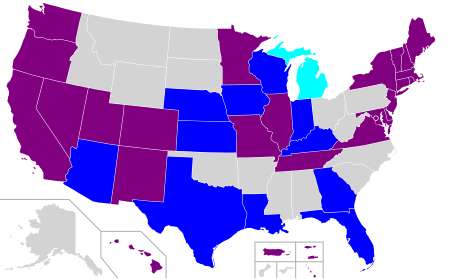Hate crime laws in the United States
§ 245(b)(2), permits federal prosecution of anyone who "willfully injures, intimidates or interferes with, or attempts to injure, intimidate or interfere with ... any person because of his race, color, religion or national origin"[1] or because of the victim's attempt to engage in one of six types of federally protected activities, such as attending school, patronizing a public place/facility, applying for employment, acting as a juror in a state court, or voting.280003, requires the United States Sentencing Commission to increase the penalties for hate crimes committed on the basis of the actual or perceived race, color, religion, national origin, ethnicity, or gender of any person.[3] The S. 1980 (104th): Church Arson Prevention Act of 1996 was introduced to Congress on June 19, 1996, but died because the Senate Committee found some places for improvement of the bill."[5] One of the changes in the bill was the sentence increase for "defacing or destroying any religious real property because of race, color, or ethnic characteristics..." from 10 to 20 years.On March 29, 2022, President Joe Biden signed the Emmett Till Antilynching Act, which expanded existing United States federal hate crime law to apply to the crime of lynching, defining it as an act of two or more people in a conspiracy to maim or kill a person based on real or perceived traits of a victim as protected under federal law.Forty-seven states and the District of Columbia have statutes criminalizing various types of bias-motivated violence or intimidation (the exceptions being Arkansas, South Carolina, and Wyoming).[10] Thirty-four states and the District of Columbia have statutes creating a civil cause of action, in addition to the criminal penalty, for similar acts.Since the inception of Black Lives Matter, critics have found some of the movement's rhetoric anti-police, with the author of the amendment, Lance Harris, stating some "were employing a deliberate campaign to terrorize our officers".[120] In 2020, Georgia enacted a new law creating the crime of bias-motivated intimidation, applying to attacks on police officers, firefighters, or emergency medical technicians.§ 534,[122] requires the Attorney General to collect data on crimes committed because of the victim's race, religion, disability, sexual orientation, or ethnicity.§ 1092(f)(1)(F)(ii),[citation needed] which requires campus security authorities to collect and report data on hate crimes committed on the basis of race, gender, religion, sexual orientation, ethnicity, or disability.The FBI's Criminal Justice Information Services Division has annually published these statistics as part of its Uniform Crime Reporting program.[126] David Ray Hate Crimes Prevention Act Please note that the figures in the table below do not contain data from all reporting agencies every year.
Sexual orientation and gender identity recognized in state hate crimes law
Sexual orientation recognized in state hate crimes law
Sexual orientation recognized for data collection about hate crimes
hate crimesreligionethnicitydisabilitynationalitygendersexual orientationgender identityU.S. Department of JusticeFederal Bureau of InvestigationTitle I of the Civil Rights Act of 196818 U.S.C.death penaltyViolence Against Women Act42 U.S.C.Violent Crime Control and Law Enforcement Act28 U.S.C.United States Sentencing CommissionFederal Sentencing Guidelinesfederal crimesBill ClintonHenry HydeMatthew Shepard and James Byrd, Jr. Hate Crimes Prevention ActNational Defense Authorization Act for Fiscal Year 2010Emmett Till Antilynching ActJoe BidenEmmett TilllynchingReconstruction eraDistrict of ColumbiaArkansasSouth CarolinaWyomingGeorgiacivil cause of actionAlabamaAlaskaArizonaCaliforniaColoradoConnecticutDelawareFloridaHawaiiIllinoisIndianaKansasKentuckyLouisianaMarylandMassachusettsMichiganMinnesotaMississippiMissouriMontanaNebraskaNevadaNew HampshireNew JerseyNew MexicoNew YorkNorth CarolinaNorth DakotaOklahomaOregonPennsylvaniaRhode IslandSouth DakotaTennesseeVermontVirginiaWashingtonWest VirginiaWisconsinSupreme Court of Georgia (U.S. state)Supreme Court of Pennsylvaniapolice officersfirefightersJohn Bel EdwardsBlack Lives Matterpolice brutalityBlue Lives MatterLance Harristhe killing of a Texas sheriffthe killings of two NYPD officersdeath of Eric Garnershooting of Michael BrownBaton RougeBaton Rouge PoliceAlton Sterlingfive police officers were killed in Dallasthree more officers were killed in Baton RougeThe Heritage FoundationEdwin MeeseBernard KerikHate Crime Statistics ActAttorney GeneralGeorge H. W. Bush20 U.S.C.Robert TorricelliCriminal Justice Information Services DivisionUniform Crime ReportingDavid Ray Hate Crimes Prevention ActCalifornia State University, San BernardinohomicideChief Justice Rehnquistwhite peopleUniversity of Southern MaineCaucasiansFirst AmendmentWisconsin v. MitchellJames B. JacobsAltschilleraffirmative actionCivil Rights Act of 1964Civil Rights Act of 1968Crime in the United StatesDiscrimination in the United StatesHistory of civil rights in the United StatesLocal Law Enforcement Hate Crimes Prevention Act of 2007Anti-Defamation LeagueNew York State LegislaturePenal LawConsolidated Laws of New YorkNational Gay and Lesbian Task Force